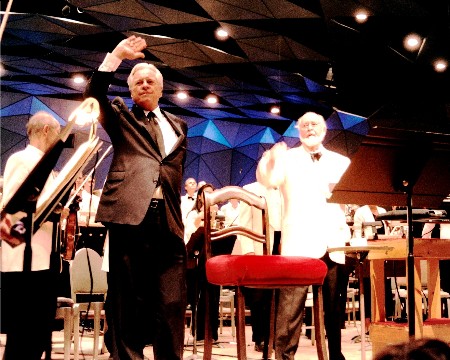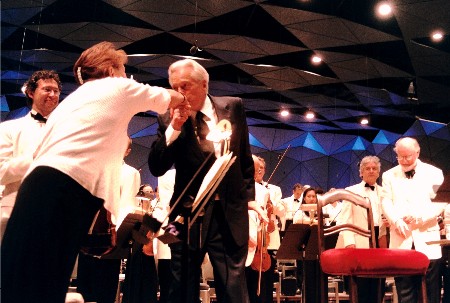Music Review: Film Night At Tanglewood A Classics Act

Hooray for Hollywood: TCM Host Robert Osborne, John Williams, and the Boston Pops at Tanglewood. Photo: Ron Barnell
Reviewed by Ron Barnell
The celebration of composer John Williams’s 30 year association with the Boston Pops Orchestra was brought to a gala conclusion on August 14th with the orchestra’s annual Tanglewood Film Festival night. Devoted to the performance of select film scores, with accompanying movie clips displayed on large projection screens, the concert presents an entertaining combination of the eye-ful and earful for the audience in the great Shed and for the large numbers of people gathered out on the lawn.
Besides the anniversary celebration for Williams and the Pops, this year’s film night sparkled because of the participation of the erudite host of Turner Classic Movies, Robert Osborne, who acted in the role of both host and moderator for the evening’s program. Osborne was particularly enlightening about how composers contribute in vital ways to the art of film, an ingredient to the overall experience that is often overlooked because of the allure of the images and the charisma of the stars.
The stage was set expertly for the evening’s movie selections: the show opened with a Williams arrangement of “Hooray for Hollywood,” which served as a background accompaniment for a montage of films from the silent through the modern era, the clips cut in a close rhythmic sync to the music.
After a short introduction by John Williams, Robert Osborne came on stage to narrate the first half of the program titled “Hollywood’s Golden Age.” Osborne related how almost all of the major film composers of the past had trouble getting their film music taken seriously mainly because in the concert halls of the day, “film music” was considered to be inferior to traditional symphonic fare. This bias thrived for years in spite of the fact that composers such as Miklos Rosza and Eric Wolfgang Korngold were European-trained composers whose own symphonies, concertos, etc, were regularly played on concert programs.
As an example, Williams and the orchestra played the evocative score by Franz Waxman for director Billy Wilder’s 1950 drama Sunset Boulevard, a classic Hollywood film about film, featuring brooding black and white imagery. Waxman’s dark, harmonic musical setting perfectly suited Wilder’s cynical tale of movie stardom gone rancid.

The Art of Movie Music: TCM Host Robert Osborne warmly acknowledges concertmaster Tamara Smirnova. Photo: Ron Barnell
Selections followed from Vertigo (Bernard Herrmann), Spartacus (Alex North), Chinatown (Jerry Goldsmith), and an extended suite of the lush, exotic music from David Lean’s Lawrence of Arabia (Maurice Jarre). It was an exhilarating experience: watching on a large screen the scenes set in the Jordanian desert, shot by cinematographer Freddie Young, as the Boston Pops Orchestra performed the score live underneath the breathtaking images.
The second half of the program featured music composed by John Williams for the films of Steven Spielberg. “Celebrating Steven Spielberg” featured the music from Jaws, Close Encounters, and, an interesting choice, 1941. Two selections from Empire of the Sun and Amistad proffered choral parts beautifully sung by members of the BUTI Young Artists Chorus.
But it was the playing of the thematic excerpts from Williams’s music to the film Schindler’s List that seemed to strike a particularly emotional chord with the audience, especially with the bitter, heartfelt violin solo, as performed by concertmaster, Tamara Smirnova.
The rousing night of film music in the Berkshires ended with an encore selection of music from Raiders of the Lost Ark.
Tagged: Film, John Williams, Music, Robert Osborne, Ron Barnell, Tanglewood, hollywood, movie
